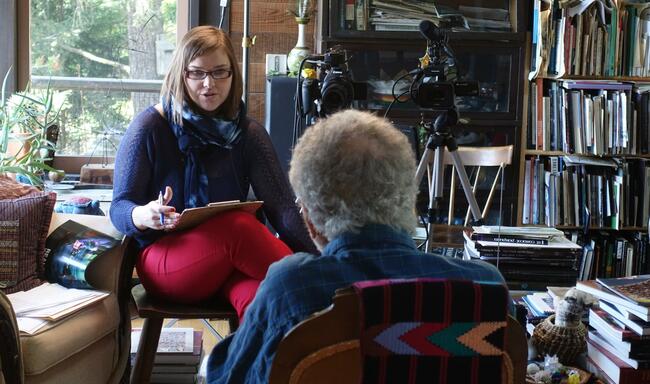Oral Historian Spotlight: Agnieszka Ilwicka

Agnieszka Ilwicka grew up in a resort town in Northeastern Poland. Her exposure to Jewish literature started early; her father used to read the stories of the classic Yiddish writer Sholem Aleichem to her in Russian translation. Agnieszka came to the United States for the first time for the Yiddish Book Center’s Fellowship Program in 2012. Here, Agnieszka reflects on her connection to Yiddish through Poland in an excerpt from the oral history interview we recorded with her at the Yiddish Book Center in October 2012:
In addition to sorting Yiddish books and helping with the Yiddish Book Center’s podcast, Agnieszka completed our oral historian training during her fellowship year. When she returned to her studies in Poland and then Israel, she brought a camera and her newly acquired interviewing skills with her. As a Field Fellow for the Center’s Wexler Oral History Project, she has recorded Yiddish students, scholars, artists, and native speakers in five different countries—expanding our collection in invaluable ways. Check out some highlights below from the 47 interviews she has conducted as part of the Project since 2012.
"I think that a great interview comes from the heart of both the oral historian and the interviewee."
Agnieszka’s first oral history was in a familiar setting for the project—the Yiddish Book Center's Karmazin Recording Studio. In October of 2012, she interviewed Karen Encarnacion about growing up in a mixed Jewish-Filipino Catholic home:
Agnieszka’s professional connections in Yiddish, activist, and Polish Jewish studies communities has helped us expand our collection to include more diverse viewpoints. In December of 2013, Agnieszka interviewed Katka Reszke, writer, filmmaker, and Polish-Jewish activist. Katka’s insights from a perspective unusual to most of us in the United States make her stories among the all-time staff favorites in the collection. Here, Katka explains the “unshakable hunch” she had growing up that she was Jewish:
As Agnieszka gained experience, she developed her own style as an interviewer. It quickly became clear that one of her great gifts as an oral historian is her ability to connect to people deeply and organically, in turn helping them feel comfortable sharing intimate stories.
In the winter of 2015–16, Agnieszka interviewed Uwe and Gabi von Seltmann, both individually and together. Gabi, a Polish artist who explores issues of identity in her work, and Uwe, a German writer and journalist, met during the Jewish Culture Festival in Krakow, and soon fell in love and married. Gabi’s grandfather was killed in Auschwitz and Uwe’s grandfather was an SS officer—together, they supported each other in conducting family research, which culminated in a collaborative project entitled, “The Future of the Past,” Uwe’s book, entitled Todleben, and their joint book, Gabi and Uwe.
"In my interviews, I try to present that every story is important because each person’s life has a unique meaning. [...] meeting with everyone who decided to share their stories with me is like a gift."
Over the years, Agnieszka has recorded oral histories in Polish and Yiddish, as well as in English. As an advanced student in the 2017 YIVO Summer Yiddish Program, Agnieszka connected with other international students. One such student was Elena Sarashevskaya, who came all the way from Birobidzhan, the Jewish Autonomous Region of Russia, where she is editor of the Yiddish section of the local newspaper Birobidzhaner Shtern (Stars of Birobidzhan). Here, she reflects on why she’s stuck with Yiddish:
One of Agnieszka’s latest interviews was with Yaakov Wasilewicz, who grew up in Czestochowa, Poland, and whose mother was the head of the town’s Jewish community organization. He had recently moved to the United States to continue deepening his knowledge and practice of Judaism through yeshiva study. Here, he shares a "nign" (wordless melody) that he composed in honor of his hometown:
Hear more from Agnieszka about her work in the oral history project in our Oral Historian Spotlight Q&A.
Watch full interviews and clips from Agnieszka's interviews here.
